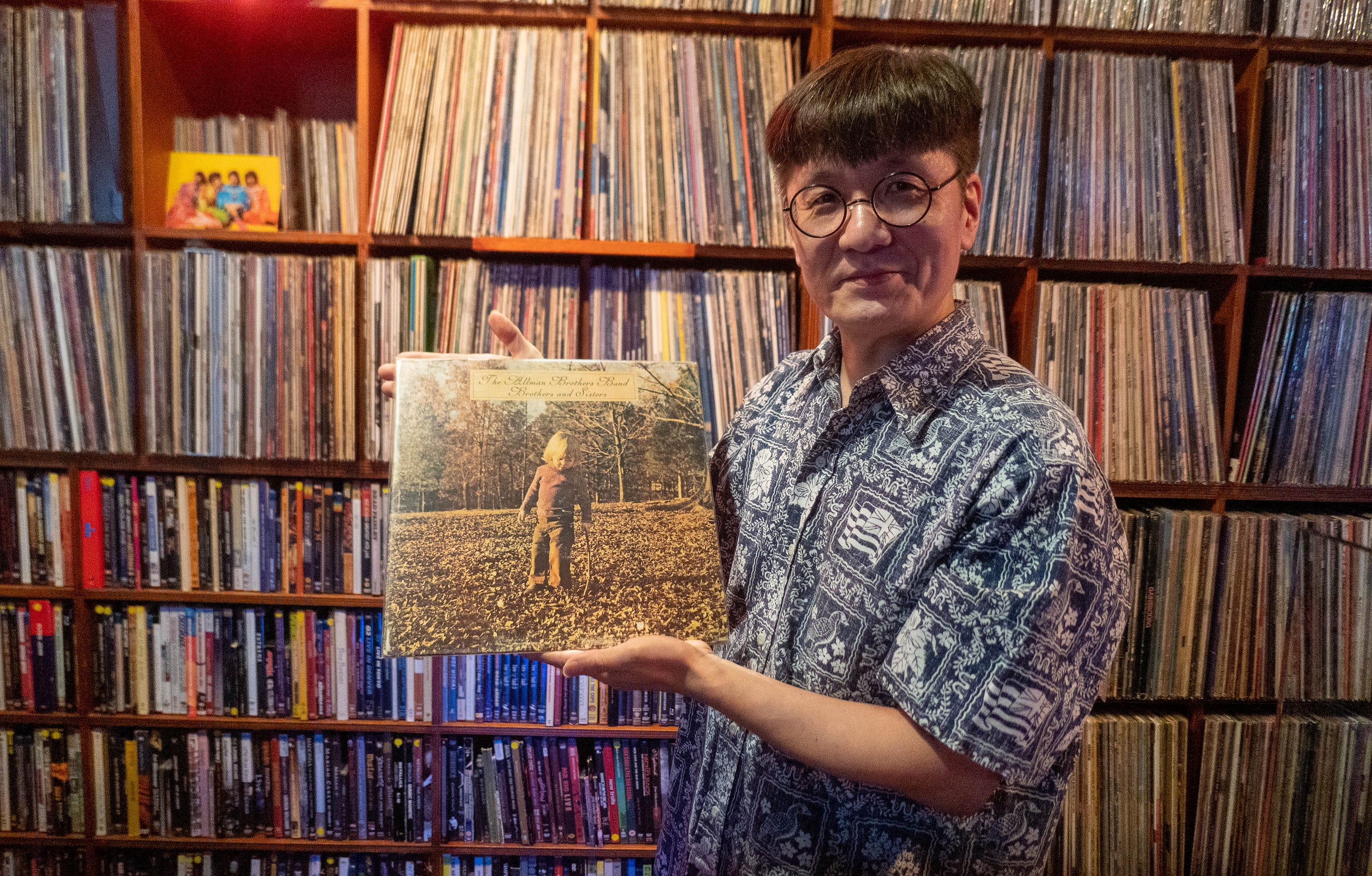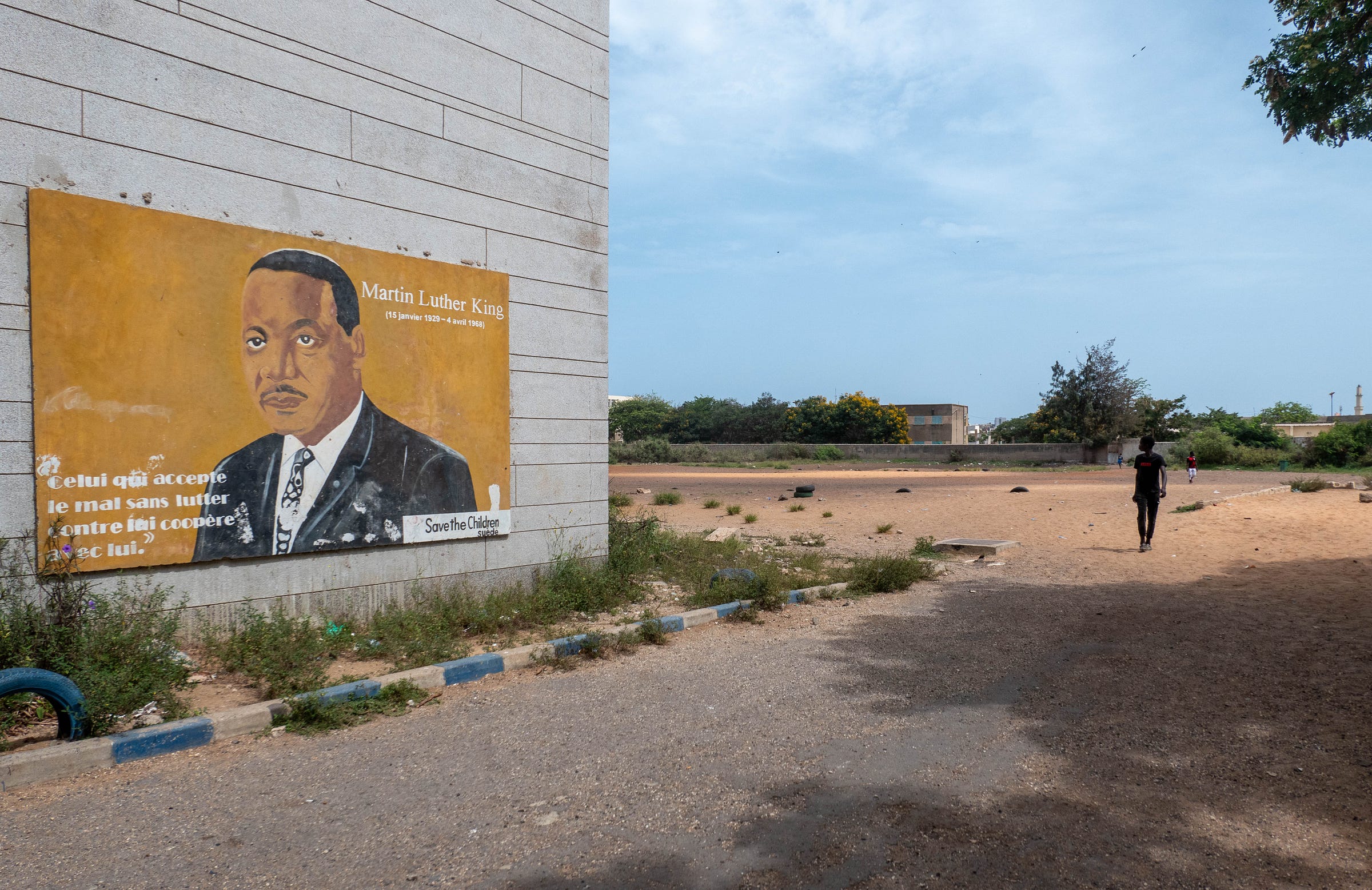No, the world doesn't hate America
It's still the world's dominant cultural power, and that's ok
(I leave this Tuesday for two months in Korea, Laos, Cambodia, and Japan, so I’ll soon return to weekly “walking the world” essays, but for now, here’s a small rant inspired by an annoying tweet. Sorry, but sometimes it happens.)
The picture above is of a young man selling pirated DVDs of anything you might want, which he could download in a second, but I don’t remember his name because he introduced himself as an “American born in Uganda.”
I’d only noticed him, and his small wooden stall, otherwise lost in the chaos of the market, because he was blasting Alan Jackson’s “Gone Country”1, one of his favorite musicians, along with Travis Tritt, which might seem incongruous in an impoverished African fishing village, but after two weeks in Kampala, and three years walking around world, wasn’t surprising at all, because American culture is everywhere, and there’s no escaping it, not in sub-Sahara Africa, and not in a Kampung of Jakarta, where shouts of “Whoomp, there it is!” ring out when one of the kids in tattered shorts on the concrete pitch scores a goal, or in the outdoor restaurant down the alley where they play the same Maroon 5 album over and over so many times, its continual run only punctuated by the call to prayer, you begin to wish you’d never taken up this whole “be open to new experiences around the globe” thing, because while this is certainly a new experience, learning the entire lyrics to “Girls Like You” wasn’t necessarily what you had in mind.
English, specifically American English, is the lingua franca of the world, the language used whenever a disparate group needs to communicate, and the dominance of American culture, particularly our music, TV, and movies, is one of the main reason for that, as well as a beneficiary of it.
That American English, and along with that, American culture, now permeates and dominates the world, shouldn’t need to be pointed out, since it’s obvious to anyone who has traveled at all, at least those not blinded by ideology.
I see it all the time, including in Uganda, but most recently in the faux Irish pub in the Faroe Islands, where the Bosnian bartender asks all the customers what they want in English, including the locals who rarely answer back in Faroese, and where the tables, a Star Wars-cantina-like mixture of Faroese, Europeans, and Asians, all chat in English. Or at the “hipster” bar down the street (Sirkus Bar), where a Greek couple who seemed intent on spending their honeymoon sitting in the same two seats talking with other customers, and the bartenders, one a young man from Sweden, another a life-long Faroese, the third a young women from Ghana, about American music, movies, and TV, all in English.
One of those customers was a thirty-ish year old woman celebrating her recent wedding engagement, who I assumed from her accent was from the US. When I asked her why she and her friends had come so far, and why she’d chosen this place to celebrate, and what state she was from, she looked at me surprised and said, “I’m from here, the Faroe Islands.”
After congratulating and complimenting her, I asked how she had learned her perfect English, and as I expected she said “from school and watching TV shows.” I didn’t really need to follow up with which show, because as I’ve seen all over the world, including Mongolia, I’d rightly guessed she spoke with her place-less US TV accent because she’d watched Friends over and over and over, in her case all ten seasons fifteen separate times.
The Swedish bartender, a young man who came to the Faroes to follow a woman, had built an identity around US skate punk — both the music and the lifestyle. While he’d never been to the US, he was hoping to save up enough to do a tour of what he saw as iconic skate parks and locations, a listing of which went right over my head to his frustration, “You’ve never heard of Burnside? Come on man, everyone knows Burnside.” Sorry kid, I guess I’m not the best American, although I was able to salvage a little cool factor from knowing about Cadman Plaza, which I never expected to talk about again after leaving Brooklyn Heights, much less with someone in Tórshavn, much less someone who saw the dreary plaza as iconic.
When during a slow moment the Ghanaian bartender, who’d come to Tórshavn to study fish farming, rightly guessed that I wasn’t into Swedish kids’ choice of Suicidal Tendencies asked me what I wanted to hear and I being all open minded and globally said, “Put on your favorite music,” and so on came “Jessie’s Girl,” which I deserved.
Feeling like I wasn’t doing a good job of being an American, I then tried to be an add-value-guy by noting the only thing I knew about Rick Springfield, which is “The singer of this song got his start in soap operas,” to which she said, “Yeah, Noah Drake in General Hospital” and that’s when I stopped talking and realized I was out of my league, or at least in the wrong bar.
My experience in the Faroes, of being in a different country, surrounded by locals, whose knowledge and appreciation of American culture is so deep, genuine, and affectionate, that I end up feeling like the foreigner, but in entirely the opposite way one would expect, isn’t unique. I only chose to highlight Uganda and the Faroes, because those are my two most recent trips, but I could write slight variations of the above scenes from every country I’ve been to, including from such different places as Vietnam, Mongolia, Kyrgyzstan, and Jordan.
Or I could write about where I will return to next week, Korea, and the LP bars, where even as an American raised in the deep south in the ‘70s who loves his stadium rock, I was outclassed in my Allman Brothers knowledge, despite my having an older brother who was their drug dealer for a few years, by another sixty-year-old guy born, raised, and still living in Seoul, and while he had been to the US multiple times, all his trips were to see bands and visit iconic rock venues.
That’s because American culture is the cultura franca of the world, and as with English as the linga franca, pointing that out shouldn’t be necessary since it’s obvious to any traveler, at least those not blinded by ideology.
But there are a lot of people, especially among the well educated, deluded by their ideology, the best example being what I believe is one of the most ignorant tweet of the last few years, at least from someone who is taken seriously by a slice of the elites, and claims to be well educated, which if you know social media, has some intense competition —
He has a lot of tweets in this genre, such as this equally absurd one,
I try to keep this a non-political newsletter, and so I don’t want to address the moral issues around US foreign policy, or even the question of exactly how dominant the US is on the political stage, but I do write about culture, and the notion that the US no longer has cultural power, or influence, is so absolutely wrong, one hundred and eighty degree wrong, that it’s laughable and I can’t let it pass without a defense.
American cultural power not only exists outside the US border, in the age of Netflix, Cartoon Network, Instagram, and Facebook, it’s at an ascendancy that continues to expand.




While you see direct examples of American culture everywhere, like in Uganda, the Faroe Islands, and the streets and buses of Nairobi, you also see the secondary spin-off influences from it, such as the spread of Hip-Hop, which is probably at this point the most popular global musical style, with every country now having a version of it, and while not always in English it is very much an American product, stylistically.
Such as the song my cab driver from the airport in Ulaanbaatar played for me when I asked him to play what he wanted to listen to. So much for hearing Tuvan throat singing.
Lurking behind the denial of US cultural dominance, or at least the global appreciation of US culture, is a belief that most of the rest of the world hates America, and consequently Americans.
That the US is loathed, and as an American you will be bombarded with criticism if you travel abroad, is something you hear a lot from US elites, and while true if your trip is limited to the Sociology department of a foreign university, it’s not the case at all with “normies” in almost every country, who have a great affection for America, or at least the idea of it, because they are not obsessed with current events, and more importantly, are capable of separating politics, and the policies of a political class, from a country’s citizens. If anyone understands you shouldn’t equate a country’s foreign policy with its residents, it is someone who has grown up in a place like Senegal, Bulgaria, or Turkey, with a corrupt and/or autocratic past/present, and a tiny out of touch ruling elite.
I’ve never, not once, been greeted with anything other than generosity, curiosity, and admiration, during my years of walking around the world, including in countries such as Vietnam, Peru, Bulgaria, that have strong historical reasons to hold a grudge against America.
Why? Because as I’ve written before,
“…what the US is selling (space, freedom, meritocracy), has a lot of buyers across the globe, including in Europe. Or to put it another way, the rest of the world (other than academics) really really love the US. Or, at least they love the idea of the US.”
As to whether the world’s image of the US is the result of our cultural dominance, and consequently the rest of the world is being hoodwinked by an overly romantic Hollywood picture of fabulous wealth, beautiful people, and most of all, people morphing, through the magic of the American dream, into fabulously wealthy beautiful people, maybe, but I’m not sure that it matters that much, because that’s what the world seems to want. Or, to put it another way, if the US, with the help of Hollywood, Nashville, and Memphis, is selling a distorted spectacle, it’s a distorted spectacle that the rest of the world eagerly desires.
The global mass love for the US and its culture is genuine, and isn’t being forced on people from above, by some sinister alignment of the industrial TV complex, Capitalism, NATO, the Davos conference, or whatever other buzzwords the cynics toss around, but instead is an organic democratic process because US culture despite all the showy glitz is still at its heart democratic, because the US despite all its faults is still at its heart a democratic country, where the desires of the demos, and their interest, have outlets that don’t feel entirely chimerical and impotent.
Hip-Hop, country music, Friends, skate punk, Maroon 5, and even Rick Springfield2 are all the collective, or singular, voices of normies, and that’s ultimately why US culture is so dominant, because that’s not surprisingly what most of the rest of the world understands and wants to hear, and most of all what they want to believe, that everyone’s story matters, not just those at the very top.
Rough dates (give or take a few days) for my upcoming Asian trip:
Oct 3rd - 7th: Seoul (getting over jet lag and hanging in LP bars)
Oct 7th - 21st: Vientiane and maybe another Laotian city
Oct 22 - Nov 6th: Phnom Penh, Cambodia
Nov 6th - Nov 17th: Walking Japan’s southern coast, from Kumamoto to Fukuoka, then taking a ferry to Busan, Korea
Nov 17th - 24th: Busan/Seoul
As always, if you are in the area, I would love a walking companion for a day, or a drinking buddy for a night. Or both!
If you are around, please reach out to me in the comments, or via email.
Until next week!
Ok, I know he’s Australian, but he moved to the US in 1972, and anyways, same thing.












Only far left and far right morons IN America hate America. Depression, honestly
I think most of the world views American culture as a product to be consumed rather than a way of life belonging to an actual group of people. This product influences many cultures but is not really considered a culture in its own right, which is why so many people are happy to add it to their own (proper) culture and also why Americans are often thought of as shallow - they don't have a proper (deep) culture, all they have is a product which passes as a culture but which most people understand to be just smoke and mirrors (i.e. movies, fast food and music).
This is just a hypothesis. Any thoughts?